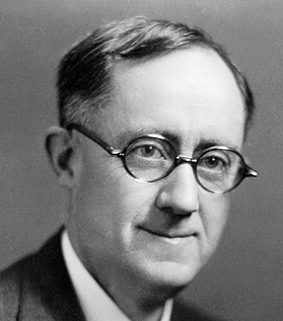1998 Hall of Achievement Inductee

Eric W. Allen (1879-1944) was the first Dean of the University of Oregon School of Journalism, from 1916 to 1944.
During his school years at the University of Wisconsin, Allen was the campus correspondent for the Milwaukee Sentinel. After graduating, he held reporting jobs at the Milwaukee Free Press and the Denver Post.
While working for the Seattle Post-Intelligencer, Allen caught the eye of University of Oregon president Prince Lucien Campbell, who understood journalism’s role in a democracy, as a former college newspaper reporter himself. In 1912, Campbell recruited Allen to come to Eugene and head the university’s nascent journalism program.
As part of his vision for a professional program, Allen felt it was paramount that J-students get practical experience in a wide variety of journalistic tasks, from reporting to typesetting to printing. To that end, he set up the University Press and a teaching lab. By 1916, what had begun as a single journalism class in 1901 had grown under Allen’s leadership into a full-fledged program with 11 courses taught by Allen and two other faculty members. That year, the UO Board of Regents raised the status of the journalism program to a School of Journalism—one of the first in the nation—and Allen was appointed its first dean.
His philosophy of discipline was the foundation on which he built the school. He wrote in the Portland Chamber of Commerce Bulletin in May 1913: “We will drill them [the new journalism students] hard in accuracy, terseness, fairmindeness, and ability to understand and sympathize with all classes of the community. Then we will throw them in and see if they can swim.”
Allen, who had a degree in philosophy, also held a strong belief in the virtues of a broad liberal arts background. A good journalist, wrote Dean Allen, “has an intelligent grasp upon the social and economic and political problems” of the day and is “able to evaluate news and interpret it in light of this knowledge.”
That’s why, by the 1930s, the School of Journalism required its students to take the majority of their course work in the arts and sciences. This is now a central principle of the national accrediting standards for journalism education.
In 1930, Allen established the first journalism graduate program in the Pacific Northwest.
Allen held the longest tenure of any dean in the school’s history, serving until his death in 1944. An excerpt from an editorial in the Salem Capital Journal, March 7, 1944, reads, “[Allen's] personal interest in his students extended far beyond the classroom and out into the world of their chosen profession. He was a friend and counselor to whom they could always turn. He was a student of newspapers, of life, literature, and the arts. But above all, he was human, friendly, and sympathetically understanding.”
In his nearly 30 years at the helm of the J-school, he saw the study of journalism grow from a mechanical, skills-oriented practice to a professional experience imbued with the kind of knowledge gained only through a complete education. To a great extent, he was a leader in this growth, and his philosophy and dedication to journalistic ethics still guide the school today.
